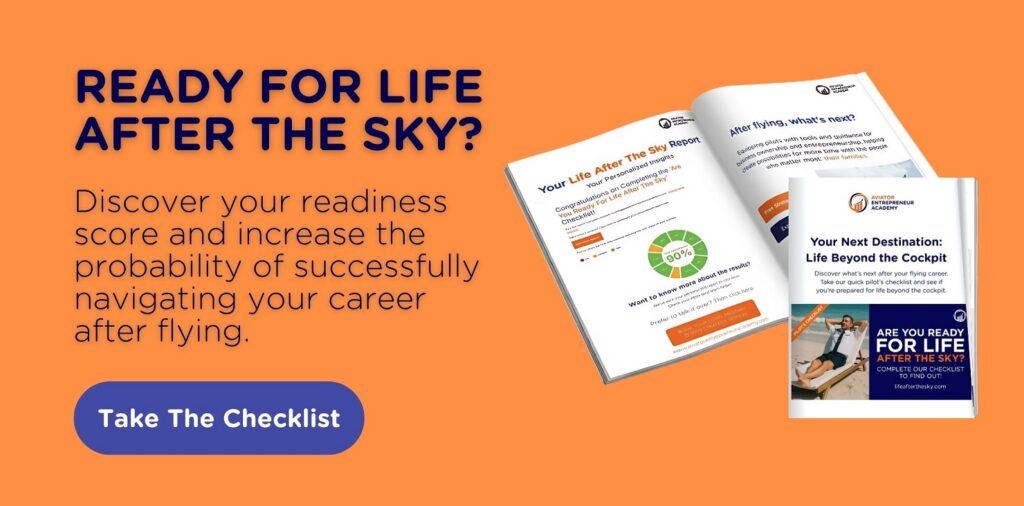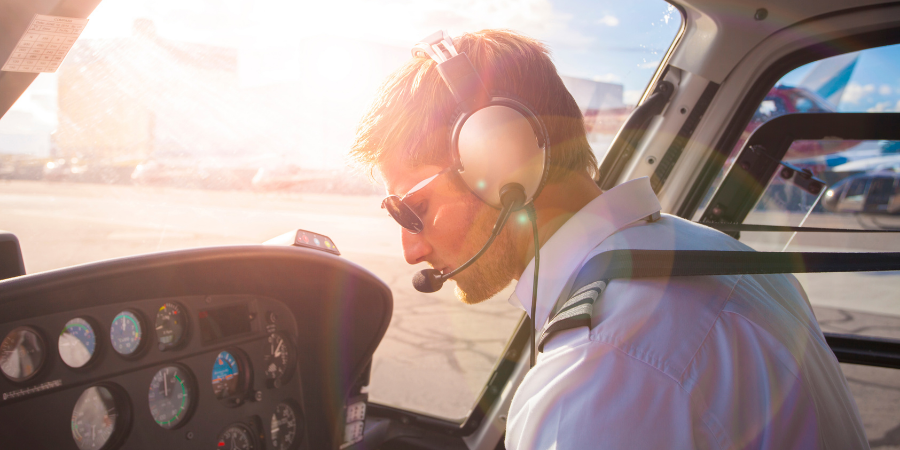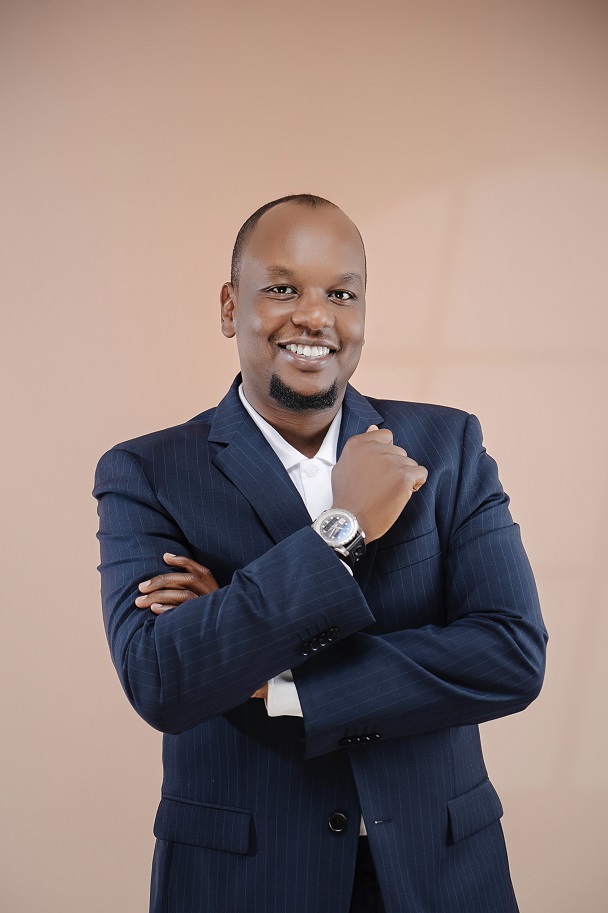You’ve flown into unexpected turbulence before, systems warnings, the kind of rough air that tests your training. But the roughest kind? It’s the inner hesitation that doesn’t show up on radar.
It sneaks in quietly when flying stops and the next chapter begins. You know it’s time to move forward but something holds you back from pressing the throttle.
This is where mindset becomes your most important system.
How to handle uncertainty, the stories you tell yourself, and how willing you are to grow will shape the altitude of everything that comes next.
Just like every flight deserves a smooth landing, every pilot deserves a clear approach to business. That’s why we’re breaking down the common mindset pilots bring into entrepreneurship and the myths that often hold them back.
Key Takeaways
- Don’t do it alone: Business isn’t a solo flight. Just like pilots rely on copilots and ATC, entrepreneurs can grow faster with mentors, networks, and guidance.
- Risk is part of the ride: Waiting for zero risk means missing the runway. Learn to assess and manage risk, rather than avoiding it.
- You don’t need an MBA: Experience, action, and real-world learning often beat classroom theory. What matters is momentum, not credentials.
- Entrepreneurship can be learned: It’s not a fixed trait. Like flying, it’s a skill built through repetition, failure, and feedback.

Run the readiness check: Before you take off, assess your current mindset, skills, and clarity. Use the checklist to spot gaps and prepare with purpose.
Four Mindset Beliefs That Hold Pilots Back
Even the most skilled pilots can face invisible barriers when moving beyond the cockpit. These internal beliefs aren’t just thoughts; they shape actions, influence decisions, and often delay progress.
That’s why we’ll break down these mindset myths and explain how you can overcome them to confidently move forward.
Myth 1: “I’ll Figure Out Business on My Own”
As pilots, we’re trained to be independent, resourceful, and decisive. We’ve learned to rely on our own judgment, especially when the unexpected hits the cockpit. So it’s natural to think that “I can figure business stuff out once I’m done with flying.”
However, the transition into business isn’t as straightforward as it might seem. In fact, 45% of businesses fail within the first five years, and more than half don’t make it past ten. This isn’t meant to discourage you; it’s a clear reminder that flying solo in business can be just as risky as doing so in the air.
A report published on PR Newswire explains that entrepreneurs who work with a mentor, even online, are five times more likely to start a business and succeed. Remember, it doesn’t have to be in-person. You can also find a YouTube channel with all the relevant info and learn from it bit by bit.
Were you assuming you need to do all this alone? Is that why you haven’t had the heart to find a mentor or search for valuable content? What kind of support do you think would lighten your load, and not add to it? Don’t forget to ask yourself these questions.
Myth 2: “Entrepreneurship is Too Risky or Hard”
Every phase of flight comes with a calculated risk, and so does entrepreneurship. The pilots who soar are the ones who don’t avoid risk; they prepare, plan, and make smart choices.
Many pilots I’ve met on and off the flightdeck are always somewhat hesitant to start a business because they think it’s too risky or too difficult. Leaving a stable paycheck for uncertainty can feel like throwing caution into the wind.
The right mindset plays a big role in achieving success. With a positive attitude and clear vision, it will help you turn ideas into real results.
Ask yourself, what feels “risky” about business to you? And what if the real risk is waiting too long to trust yourself and lose the time you could have used wisely?
Myth 3: “I Should Get an MBA or Business Degree First”
It makes sense to think you need a business degree before starting a business. Maybe an MBA seems like the checklist item that will make you feel ready. However, that’s not true. Formal education has its place, but it’s not a prerequisite to start your business journey.
Many successful entrepreneurs, including pilot-turned-business owners, started without MBAs or formal business degrees. They learned by doing, leveraging resources, mentorship, and targeted education.
Moreover, studies even show that entrepreneurs with relevant practical experience tend to outperform those with advanced degrees when it comes to startup success.
Remember, in aviation, continuous learning happens throughout your career, not just before your first flight. So, what’s holding you back? Are you waiting for permission from someone to begin? What is there to lose from starting small instead of waiting for the “perfect” time?
Myth 4: “I’m Not the Entrepreneur Type”
Have you been telling yourself that you’re not cut out to be an entrepreneur? What could change if you stopped thinking about it and just started acting like one? This is a good way to understand where you stand and why you’re not even trying.
Many pilots hesitate to step into business because they believe they’re simply “not the entrepreneur type.” Maybe you think entrepreneurs are risk-takers or salespeople, and that doesn’t fit your pilot profile.
Did you know Bill Gates’ first business venture was a system that recorded traffic information? It failed miserably. Yet he went on to become one of the richest people in the world.
He learned from his mistakes and stayed consistent. That’s the mindset of every successful entrepreneur, even if they fail once, twice, or more times. Success comes to those who wait and work for it.
How to Shift Your Mindset for Success
One of the most powerful shifts that you can make today is embracing a growth mindset. Dr. Carol Dweck’s research shows that those who believe their skills and intelligence can grow through effort and learning achieve far greater success than those who see their abilities as fixed.
As a pilot, you’re no stranger to training and continuous improvement. Every new aircraft type, rating upgrade, and emergency drill was a chance to learn and grow. The same principle applies to business.
Risk is another area where pilots have a natural advantage. In aviation, managing risk is second nature, from pre-flight checks and weather assessments to contingency planning.
The key is calculated risk-taking, not reckless gambles. You already know how to weigh odds and make decisions under pressure; now apply that skill to your business.
Your Pre-Flight Checklist for Life After the Sky
Pilots, like us, trust checklists for a reason as it brings clarity, prevents oversight, and prepares us for what’s ahead.
That’s exactly why we created the “Are You Ready For Life After The Sky?” Checklist.
It’s a quick 3-minute scan designed to help you assess your current mindset, spot any blind spots, and get a clearer picture of where you stand before making your next move.
Think of it as a pre-flight briefing for the next chapter; simple, precise, and built for how pilots think.
Take the checklist and see what shows up.
Invitation to join our FREE Strategy Session
Most pilots are one honest conversation away from clarity. This is that conversation.
Complete our “Life After the Sky” checklist, then join me for a FREE 15-minute “Strategy Session” via Zoom.
This session has been created for pilots who want to take ownership of what comes next.
Those who want action, not just to talk about it.
In just 15 minutes, we’ll:
- Review your checklist results
- Identify the one obstacle holding back your reinvention
- Translate your checklist results into a clear starting point
Start your pre-flight assessment for the next chapter of your journey by Booking your free strategy session here!



